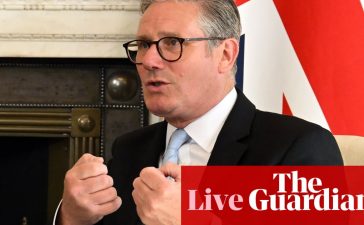Key events
Turning away from the Treasury committee for a moment, the Liberal Democrats have launched their local election campaign with a stunt that echoes and parodies a Boris Johnson photocall from the 2019. The Lib Dems are signalling their intention to knock down the Tory “blue wall”. Henry Riley from LBC has the clip.
It is very Lib Dem. When Johnson drove through a wall labelled “gridlock” with a “Get Brexit Done” JCB, he insisted on driving himself. In this version, Ed Davey is in the passenger seat and someone else is at at the wheel. Health and safety perhaps.
It is a big improvement on the last Lib Dem photocall of this kind, which did not quite convey the impression intended because of Davey’s diminutive orange mallet.
There are no urgent questions in the Commons today, which means the Robert Jenrick statement on accommodation for asylum seekers will start at around 12.30pm.
Hunt plays down concerns lifting lifetime pensions savings cap creates inheritance tax loophole
Browne asks if the Treasury is looking at changing the rules that allow people to pass on their pension pots to their children when they die free of inheritance tax.
(Experts have suggested that Hunt is creating a massive inheritance tax loophole.)
Hunt says if this happens people do pay tax, at the marginal rate. So they are not escaping tax, just paying it in a different way.
Browne says, for basic rate taxpayers, that still amounts to an advantage. He says the Treasury should look at this issue.
Anthony Browne (Con) ask Hunt why he did not just create a doctors-only scheme to remove the cap on tax-free pensions savings.
Hunt says a doctors-only scheme would have been regressive, because the scheme that the government did announce would not help the wealthiest 20% of doctors.
He says a doctors-only scheme would not have been a lot cheaper.
And he says he wanted to remove barriers to work for people in their 50s generally.
Douglas Chapman (SNP) asks Jeremy Hunt if HS2 has “hit the buffers”. He suggests the money should be spent elsewhere.
Hunt says he does not agree. Countries like Germany or Japan have less regional inequality because people can travel around the country much more easily. In Japan you can get on a bullet train and get to Tokyo within three hours.
Chapman says he does not expect a bullet train to arrive in Scotland any time soon.
Back at the Treasury committee Andrea Leadsom (Con) asks why post-pandemic economic inactivity is higher in the UK than in other G7 countries.
Jeremy Hunt, the chancellor, says that is a good question. A lot of people over the age of 50 have given up work, he says. For some people, like doctors, pension rules are a factor. He says he has addressed this.
Q: That does not answer the question. Why is the situation worse in the UK?
Hunt says the UK is about “middle of the pack” for OECD countries.
Q: Are people being more honest about their health? Or has health got worse?
Hunt says the government has some of the answers to this, but not all of them.
The number of long-term sick has grown. There are 2.5 million people who are long-term sick or disabled. He says the DWP white paper is addressing this.
Yesterday, when Rishi Sunak was giving evidence to the Commons liaison committee, there was a cryptic question from Labour’s Catherine McKinnell, who wanted to know if he had anything to declare in relation to the government’s childminder recruitment bonus scheme. People who sign up as a childminder will get a £600 bonus, but £1,2000 if they sign up through an agency.
Sunak said all his interests were declared. And he defended the anomaly, saying agency recruitment costs were higher.
In a report for the i, Richard Vaughan and Paul Waugh explain what prompted the question; Sunak’s wife, Akshata Murty, has shares in a childcare agency that could benefit, they report. They say:
According to Companies House, Ms Murty was listed as a shareholder in Koru Kids as recently as 6 March 2023 and has been since March 2021 …
Agencies such as Koru Kids can expect to see a major increase in business as a result of the pilot, as it will drive prospective childminders to sign up via agencies.
No 10 told the i that it would not comment on Murty’s business arrangements because she was a private individual, and that Sunak had declared all relevant interests.
Q: How many couples will lose access to child benefits because of your stealth taxes on the higher rate tax threshold?
Hunt says he will have to write to the committee with the anwer.
But he says the childcare plans will make a big difference to many people.
Hunt says Treasury has not yet decided how much extra DHSC will get to fund pay deal for NHS workers
Eagle how the pay settlement for health workers will be funded.
Hunt says, as with all pay settlements, departments fund them from the money they get in the spending review. But in exceptional circumstances they can speak to the Treasury about extra help.
He says this is a special situation, because of inflation.
There will be a discussion about how much help health will get. But that discussion has not taken place yet, he says.
(That means the Department of Health and Social Care does not know yet how much extra money it will get.)
He says there will be no reduction in frontline services. But that does not mean departments won’t have to make efficiency savings, he says.
Q: Public sector workers have had huge pay cuts?
Hunt says the government has spent almost £100bn helping people with the cost of living, with particular help for people on low incomes.
Q: So, if workers are voting on pay offers, your message is they are not fully funded, and much of it will come from existing budgets?
Hunt does not accept that. He says he will fund these pay rises in the way they are always funded. He goes on:
But we make a commitment that there will not be a degredation of frontline services for the public.
Back in the Commons Treasury committee, Labour’s Angela Eagle asks if £10,000 a day is a good rate for a former chancellor. She is referring to Kwasi Kwarteng.
Jeremy Hunt says he does not know. He says he hopes to be chancellor for a long time.
Kate Forbes turned down cabinet job get get better work-life balance, says Scotland’s new deputy first minister
Kate Forbes chose to turn down a cabinet post in the Scottish government to achieve a better work/life balance, Shona Robison, the new deputy first minister, said this morning.
Forbes was narrowly beaten by Humza Yousaf in the SNP leadership contest. Yesterday Yousaf offered Forbes, who had been finance secretary, the post of rural affairs secretary, but she turned it down and is returning to the backbenches.
This was widely seen as a blow to Yousaf’s hopes of uniting the party after a leadership contest that was particularly acrimonious and damaging to the SNP’s reputation.
In her first broadcast interview in her new role, Robison said Forbes refused a cabinet job mainly for personal, not political reasons. She said:
I understand that the discussion was very cordial and was very much centred on what Kate’s thoughts were and I think she had reflected upon how hard the campaign had been for family life and her desire for a better work-life balance and she decided that time out of the spotlight would be best to spend time with her family, which is understandable.
This is consistent with what Forbes said on Twitter yesterday.
To the great credit of @HumzaYousaf the first official convo he had after Monday’s result was with me. He has been respectful, supportive & warm throughout. In whatever capacity I serve, I’ll support him. Ps after 5 long weeks, I’ll be delighted to see more of my family!
— Kate Forbes MSP (@_KateForbes) March 28, 2023
Robison also said that Yousaf’s cabinet would be unlike Nicola Sturgeon’s. She said:
I think what you’ll see is a cabinet that looks quite different and feels quite different.

Hunt tells the Treasury committee that he believes in NHS reform. It was not possible to pursue that during the pandemic, he says. But he says in the autumn statement he asked Patricia Hewitt, the former Labour health secretary, to carry out a review. She is looking, in particular, at whether the NHS has too many targets, he says.
Danny Kruger (Con) goes next. He asks if the government has had a consistent growth strategy over the past few years.
Hunt says, with the exception of the mini-budget, there has been consistency.
Baldwin asks about the Office for Tax Simplification. Kwasi Kwarteng abolished this when he was chancellor. Baldwin asks why Hunt has not reversed that. Is that because the tax system does not need simplification?
No, says Hunt. He says he still wants to simplify the system.
He will take that as a personal responsibility, instead of having a body in charge of it.
He says he will be asking his officials to simplify measures before budgets; he just does not think a special body is needed.
Jeremy Hunt gives evidence to Commons Treasury committee about the budget
Jeremy Hunt, the chancellor, has just started giving evidence to the Commons Treasury committee about the budget.
Harriett Baldwin (Con), the chair, put it to Hunt that the budget projections based on the assumption that fuel duty will rise next year are a “fiction”. She made the same point to Rishi Sunak yesterday.
Hunt said he did not accept that. When it was put to him that he would not be putting up fuel duty by 12p in an election year, he said that he did not know what he would do.
Humza Yousaf, Scotland’s new first minister, has posted a picture on Twitter of his family praying this morning after breakfast in Bute House, the first minister’s official residence.
My family and I spending our first night in Bute House after today’s parliamentary vote. A special moment leading my family in prayer in Bute House as is customary after breaking fast together. pic.twitter.com/yjPY1vpJMB
— Humza Yousaf (@HumzaYousaf) March 28, 2023
Severin Carrell has written an article setting out the challenges facing Yousaf in his new job.
Overseas aid budget cut to meet soaring costs of housing refugees in UK
A third of the UK’s overseas aid budget was spent by the Home Office on housing refugees in a poorly managed programme that contained few cost-saving incentives, the government’s independent watchdog on aid has found.
Here is the report from the Independent Commission for Aid Impact. And here is our news story by Patrick Wintour.
Dominic Raab claims hotel accommodation acts as ‘incentive’ for small boat arrivals
Good morning. We are getting a statement in the Commons later on plans to stop housing new asylum seekers in hotels, and instead to put them in disused army barracks, on ships – and possibly even on a barge.
Dominic Raab, the justice secretary and deputy prime minister, has been giving interviews this morning and he told Sky News that one reason for moving people out of hotel accommodation, which is costing the government more than £6m a day, was that it was acting as an “incentive” for small boat arrivals.
We must end this perverse incentive through the hotels and more generally with the hospitality that in a broader sense this country gives, encouraging the wrong people, which is the criminal gangs and illegal migrants, to make these very dangerous journeys.
But on Sky, and in other interviews, Raab was less keen to confirm one of the most eye-catching claims in some of the reports about today’s announcement – that asylum seekers will be placed on a barge.
In its story the Times reports:
Ministers have procured an “accommodation barge” capable of holding hundreds of migrants, which is being refitted. They have yet to decide where it will be moored, although it will be in a port rather than at sea.
The Refugee Council said it was “deeply concerned” by the plans, saying the suggested accommodation is “entirely unsuitable” to the needs of asylum seekers.
Asked in various interviews to confirm that a barge would definitely be used to house asylum seekers, Raab just said it was an option. As Sunder Katwala, from the British Future thinktank, explains in this Twitter thread, similar ideas have been briefed by government repeatedly in the past, without actually happening. The Guardian has been told that the Home Office is considering using a former cruise ship from Indonesia. But that might sound a bit too luxurious for papers like the Daily Mail, and so it is not hard to see why their story is about barges instead.
Here is the agenda for the day.
9.45am: Jeremy Hunt, the chancellor, gives evidence to the Commons Treasury committee about the budget.
Noon: Dominic Raab faces Angela Rayner at PMQs. Rishi Sunak is away at Betty Boothroyd’s funeral.
After 12.30pm: Robert Jenrick, the immigration minister, gives a statement to MPs about plans to house asylum seekers.
I’ll try to monitor the comments below the line (BTL) but it is impossible to read them all. If you have a direct question, do include “Andrew” in it somewhere and I’m more likely to find it. I do try to answer questions, and if they are of general interest I will post the question and reply above the line (ATL), although I can’t promise to do this for everyone.
If you want to attract my attention quickly, it is probably better to use Twitter. I’m on @AndrewSparrow.
Alternatively, you can email me at andrew.sparrow@theguardian.com.









